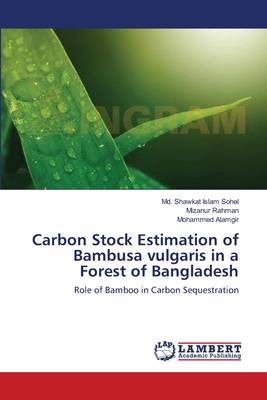
- Afhalen na 1 uur in een winkel met voorraad
- Gratis thuislevering in België vanaf € 30
- Ruim aanbod met 7 miljoen producten
- Afhalen na 1 uur in een winkel met voorraad
- Gratis thuislevering in België vanaf € 30
- Ruim aanbod met 7 miljoen producten
Zoeken
Carbon Stock Estimation of Bambusa vulgaris in a Forest of Bangladesh
Role of Bamboo in Carbon Sequestration
Md. Shawkat Islam Sohel, Mizanur Rahman, Mohammed Alamgir
Paperback | Engels
€ 53,95
+ 107 punten
Omschrijving
Forests potentially contribute to global climate change through their influence on the global carbon (C) cycle. To mitigate the global climate change impact, Kyoto Protocol developed a system named Clean Development Mechanism (CDM). Under CDM, Carbon credits are gained from plantation activities in developing countries. But unfortunately none of the CDM forestry projects use bamboo and was overlooked in the negotiating process, although it is a part of forest ecosystem. Hence, this book discuss the prospects the carbon sequestration potential of Bambusa vulgaris of Lawachara national park of Bangladesh.
Specificaties
Betrokkenen
- Auteur(s):
- Uitgeverij:
Inhoud
- Aantal bladzijden:
- 56
- Taal:
- Engels
Eigenschappen
- Productcode (EAN):
- 9783659121159
- Verschijningsdatum:
- 15/06/2012
- Uitvoering:
- Paperback
- Afmetingen:
- 152 mm x 220 mm
- Gewicht:
- 95 g

Alleen bij Standaard Boekhandel
+ 107 punten op je klantenkaart van Standaard Boekhandel
Beoordelingen
We publiceren alleen reviews die voldoen aan de voorwaarden voor reviews. Bekijk onze voorwaarden voor reviews.







